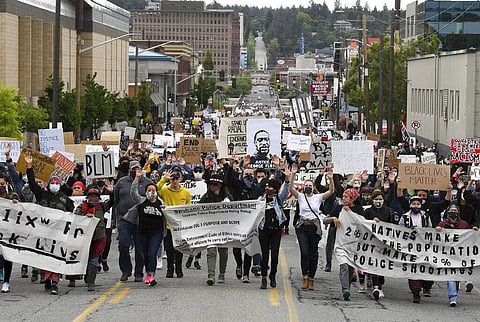

WASHINGTON: Dozens of National Guard troops from South Carolina were seen checking out of their Washington, D.C, hotel shortly before President Donald Trump tweeted he was giving the order to withdraw guard forces from the nation's capital.
The troops sipped coffee from an adjacent Starbucks and smoked cigarettes Sunday morning as they awaited buses to take them to the airport for a flight home.
Trump ordered guard troops into D.C. to "dominate" the streets after some protests over the killing of George Floyd turned violent.
The city's mayor called on Trump last week to withdraw outside forces amid days of largely peaceful protests.
Police moved barricades Sunday so protesters could approach the Trump International Hotel and Tower in midtown Manhattan as thousands continued to march against police brutality this time without a curfew looming in the night.
Mayor Bill de Blasio lifted the city's 8 pm curfew ahead of schedule Sunday after a peaceful night Saturday, free of the clashes or ransacking of stores that rocked the city days earlier.
"I want to thank everybody who has expressed their views peacefully," de Blasio said Sunday morning.
"I made the decision to end the curfew. And honestly, I hope it's the last time we will ever need a curfew in New York City."
The curfew, New York's first in decades, had been set to remain in effect through at least Sunday, with officials planning to lift it at the same time the city enters the first phase of reopening after nearly three months of shutdowns because of the coronavirus.
The mayor said a decision hadn't been made yet on whether to lift a ban on vehicles in Manhattan south of 96th Street after 8 pm.
The move followed New York City police pulling back on enforcing the curfew Saturday as thousands took to the streets for another day of marches and rallies sparked by the May 25 death of George Floyd at the hands of Minneapolis police.
Peaceful protests continued Sunday with thousands of protesters, most of them wearing masks, walking through Manhattan chanting "Black Lives Matter" and "George Floyd."
Brandon Watts, a black pastor at Epiphany Church in Brooklyn, mandated that participants wear a mask at a "Pray & Protest" march he organized Sunday with several other churches.
Attendees were offered free coronavirus testing at one of the participating churches.
"COVID-19 hit the inner city harder than anybody else," Watts said.
"And so we have to be very careful. We're the only ones in a pandemic within a pandemic."
Catherine Corien, a 60-year-old dental hygienist in Brooklyn, held off attending protests all week because she was afraid of catching the virus, but she stood near the back of a protest in Bed-Stuy on Sunday wearing a mask and keeping some distance from other protesters.
"I'm very concerned, but at the same time, a lot of people, if they are like me and decided to stay home, nothing would have happened," she said.
Police at multiple protests in Brooklyn on Sunday were not wearing riot masks, which had been standard at protests for the past week.
Some officers posed for photos with vest-wearing bikers, and barricades at the Trump hotel at Columbus Circle were moved for protesters and replaced when they passed through the area.
De Blasio said police had arrested just four people and issued 24 court summonses on Saturday.
There were more than 2,000 arrests made through Friday morning, with the largest number coming on Sunday and Monday, when hundreds were arrested as the police tried to control crime in Manhattan's shopping districts.
More than two hours after the curfew had passed Saturday night, groups of demonstrators continued to march in Manhattan and Brooklyn, while police monitored them but took a hands-off approach.
Local politicians and civil liberties advocates had called for an end to the 8 pm curfew, complaining that it causes needless friction when officers try to enforce it.
But de Blasio had initially insisted the curfew would remain in place throughout the weekend.
Civil liberties organizations had threatened to sue if the curfew was extended beyond Sunday.
The end of the curfew comes as New York City prepares to begin reopening some businesses Monday, including manufacturing and construction companies, wholesalers and retailers.
Between 200,000 and 400,000 people are expected to head back to the workplace Monday in the city.
New York Gov.Andrew Cuomo reiterated his call for people who have attended the protest marches to get tested for the coronavirus.
"Get a test. Get a test," the governor said Sunday, adding that the state planned on opening 15 testing sites dedicated just to protesters so they can get results quickly.
"I would act as if you were exposed, and I would tell people you are interacting with, assume I am positive for the virus."